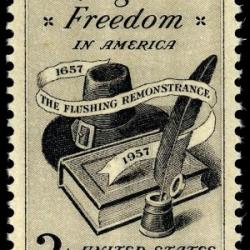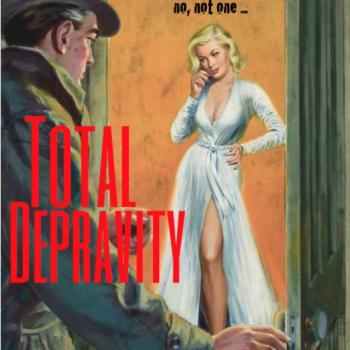Just came across this while looking for something else.*
Mike Wallace interviews Reinhold Niebuhr, April 27, 1958:
WALLACE: Dr. Niebuhr, the first question I’d like to put to you is perhaps a very obvious one, but I would like a kind of a capsulized answer, if I may. We hear about the necessity for a separation between church and state. If religion is good, why should our society be based upon a separation between the church and the state?
NIEBUHR: Your “if” is a very big one — if religion is good, it may be very good and it may be bad. The separation of church and state is necessary partly because if religion is good then the state shouldn’t interfere with the religious vision or with the religious prophet. There must be a realm of truth beyond political competence, that’s why there must be a separation of churches. But if religion is bad and a bad religion is one that gives an ultimate sanctity to some particular cause, then religion mustn’t interfere with the state. So one of the basic democratic principles as we know it in America is the separation of church and state.
WALLACE: Well, now this brings us to the issue of possible religious infringements on freedom here in the United States. I’m going to talk about several. First-off: The Roman Catholic Church opposes birth control and divorce and there is no doubt that this opposition has blocked the spread of birth control and easier divorce laws; not merely for Catholics, but for non-Catholics as well. Do you consider such measures an infringement on the rights and liberties of non-Catholics?
NIEBUHR: When you say not merely for Catholics that is the crux of the matter. A church has the right to set its own standards within its community. I don’t think it has a right to prohibit birth control or to enforce upon a secular society its conception of divorce and the indissolubility of the marriage tie.
WALLACE: When you say enforce upon a society how does the Catholic Church enforce? It suggests and enforces for Catholics.
NIEBUHR: No, that’s the point. Whenever a church does anything for its own group, it has that right.
WALLACE: Surely.
NIEBUHR: But when it reaches up beyond its group and tries to enforce its standards upon a society that doesn’t accept these standards, and perhaps for good reason, perhaps for bad reason, but anyway this is the problem we face in pluralistic society, that not necessarily every standard that every church tries to enforce upon the society is from the society’s standpoint a good standard.
Seemed timely.
– – – – – – – – – – – –
* Mike Lux has a thoughtful post about the dream of America as a “(Shining) City on a Hill.” Lux contrasts the communal spirit of John Winthrop’s original vision — “we must be willing to abridge our selves of our superfluities for the supply of others’ necessities” — with the self-centered individualism of conservatives these days. (Go read the whole thing.) I was looking for a riff from Niebuhr in which he knocks down the hubris of “City on a Hill” nationalism, but found the above interview instead.












